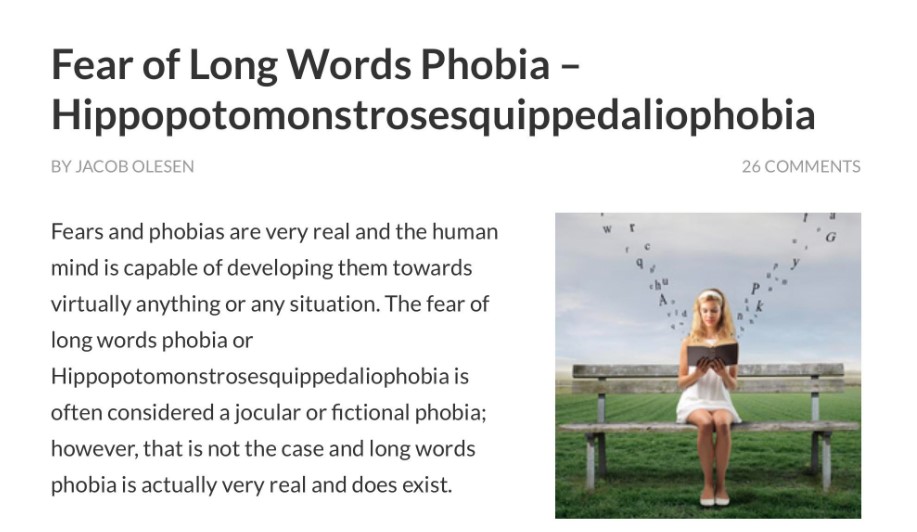BOURSESSENEGAL – Many people experience anxiety in various forms, but one of the more unique fears is the fear of long words, scientifically known as hippopotomonstrosesquippedaliophobia. This lengthy term can be ironically intimidating, making it a perfect example of the very anxiety it describes. In this blog post, we’ll explore the fear of long words, its symptoms, potential causes, and effective strategies for overcoming it.
What is the Fear of Long Words?
The fear of long words, or hippopotomonstrosesquippedaliophobia, isn’t just about feeling overwhelmed by difficult vocabulary. For many, it signifies a deeper anxiety related to communication and expression. Imagine sitting in a meeting or classroom, wanting to contribute but feeling paralyzed by the fear of mispronouncing or stumbling over complex terms. This anxiety can hinder one’s ability to participate fully in discussions or to express thoughts clearly.
Symptoms of Hippopotomonstrosesquippedaliophobia
Like other phobias, the fear of long words can manifest in various physical and emotional symptoms. Here are some common indicators:
- Sweating: The thought of encountering a long word can cause excessive sweating.
- Racing Heart: Anxiety often leads to a rapid heartbeat when faced with complex vocabulary.
- Avoidance: Individuals may go out of their way to avoid reading or situations where they might need to use longer words.
- Trembling: Physical manifestations of fear can include shaking or trembling when attempting to read or pronounce long words.
- Difficulty Concentrating: Anxiety can cloud focus, making it hard to think clearly or process information.
Understanding these symptoms is crucial for those who face this fear. Recognizing that it’s a common response can alleviate some of the anxiety associated with it.
Causes of the Fear of Long Words
While everyone’s experience with anxiety is unique, several common factors contribute to developing a fear of long words:
1. Previous Experiences
Negative experiences associated with long words can create lasting anxiety. For instance, struggling to pronounce a long word in front of peers can lead to embarrassment and a heightened fear in future situations.
2. Social Anxiety
People with social anxiety may worry excessively about how others perceive them. This concern can amplify when long, complex vocabulary is involved, making communication seem daunting.
3. Perfectionism
Those who hold themselves to very high standards may fear making mistakes when using complicated language. This fear of failure can deter individuals from engaging in conversations altogether.
4. Limited Exposure
If a person rarely encounters longer words, the unfamiliarity can generate anxiety. Regular exposure can help mitigate this fear over time.
How to Overcome the Fear of Long Words
The good news is that you can take proactive steps to manage and eventually overcome the fear of long words. Here are some practical strategies:
1. Gradual Exposure
Start small. Begin with shorter, less intimidating words and gradually work your way up to longer terms. This method, known as desensitization, helps build confidence in your ability to handle longer words over time.
2. Practice Pronunciation
Familiarize yourself with the pronunciation of longer words. Use online resources, such as pronunciation guides or language apps, to hear how others pronounce them. Repeating words aloud can help lessen anxiety.
3. Mindfulness Techniques
Mindfulness can help reduce anxiety. Practicing deep breathing, meditation, or visualization techniques before encountering situations where long words may arise can create a sense of calm.
4. Reframe Your Thinking
Challenge negative thoughts associated with long words. Instead of thinking, “I’ll embarrass myself,” replace that with, “I can learn and improve.” Positive affirmations can reshape your mindset and reduce anxiety.
5. Engage in Discussions
Join groups or forums where vocabulary is frequently discussed. Engaging with others can help normalize the use of long words and create a supportive environment for practice.
6. Seek Professional Help
If your fear significantly impacts your daily life, consider consulting a mental health professional. Therapies such as cognitive behavioral therapy (CBT) can be particularly effective in addressing specific phobias.
Conclusion
The fear of long words may seem peculiar, but it’s a genuine challenge that many individuals face. Understanding the symptoms, causes, and effective strategies for overcoming this fear can empower you to manage your anxiety better. Remember, language is a tool for communication, and with practice and patience, you can become more confident in using it. Embrace the journey of learning, and don’t hesitate to reach out for support when needed. You’re not alone in this!
By addressing your fear and gradually exposing yourself to the vocabulary you wish to master, you can take steps toward feeling more comfortable and confident in any situation. Whether in a casual conversation or a formal setting, you’ll find that the power of words can be exhilarating rather than frightening.
REFERENCE : odin99



